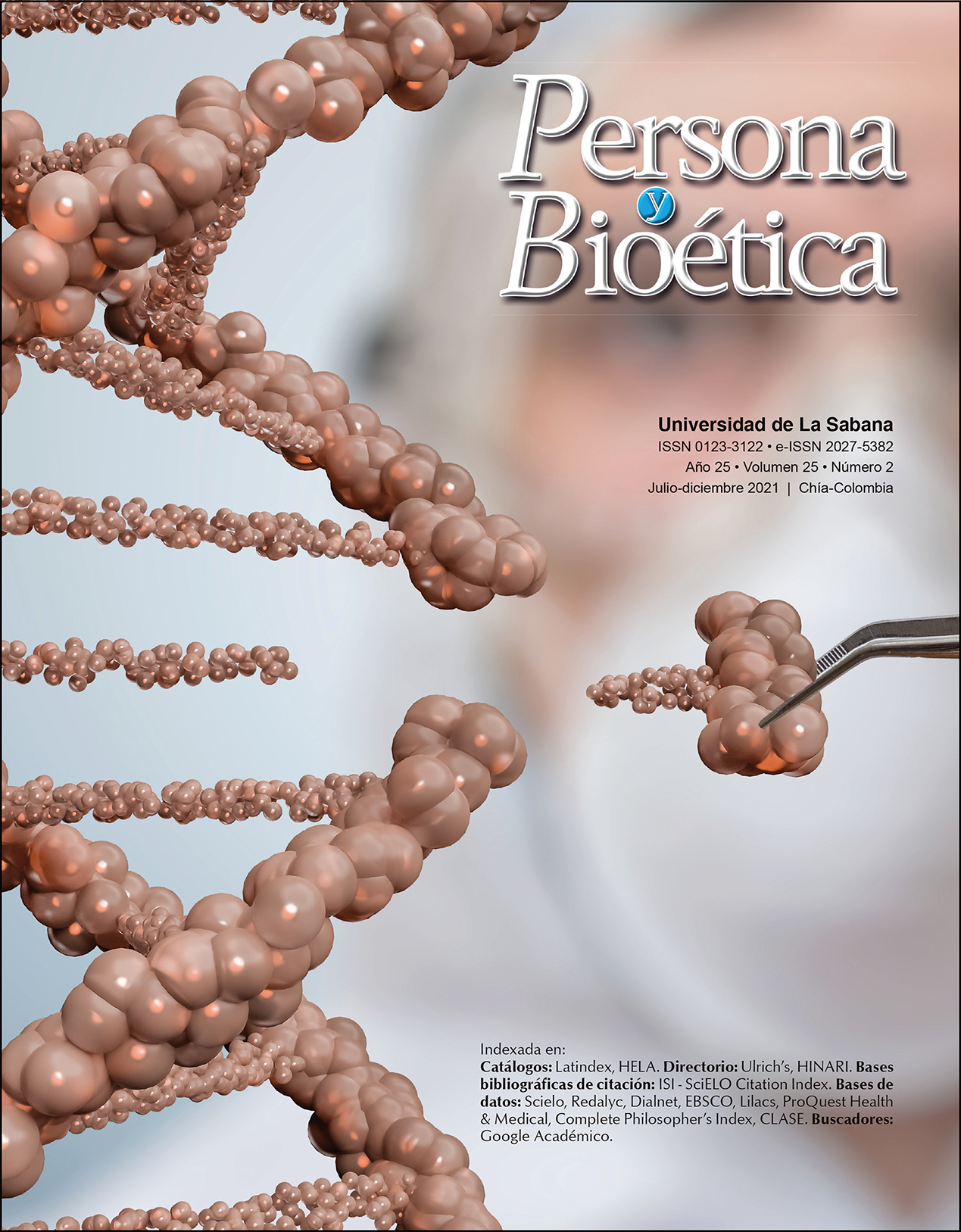Cuidado e inteligencia artificial: una reflexión necesaria
DOI:
https://doi.org/10.5294/pebi.2021.25.2.8Palabras clave:
Inteligencia artificial, robótica, enfermería, teoría de enfermería, éticaResumen
La enfermería no es ajena al cambio revolucionario que supone la introducción de la inteligencia artificial en el cuidado de la salud. A principios de 2021 se publicaron las conclusiones del think-tank internacional sobre la inteligencia artificial y la enfermería, en las que se reconoce la relevancia del uso de dichas tecnologías para aumentar y extender las capacidades de esta disciplina, entre ellas, el cuidado. Una valoración ponderada acerca del acierto de estas conclusiones exige, necesariamente, una reflexión epistemológica sobre el cuidado. En el presente artículo reflexionaremos sobre la incidencia de la inteligencia artificial en el cuidado de enfermería desde la perspectiva de la ética del cuidado y a la luz de los principales aportes del Samaritanus Bonus.
Descargas
Citas
Congregación para la Doctrina de la Fe. Carta Samaritanus Bonus sobre el cuidado de las personas en las fases críticas y terminales de la vida; 2020. Disponible en: https://press.vatican.va/content/salastampa/es/bollettino/pubblico/2020/09/22/carta.html
Spaemann R. El sentido del sufrimiento. Atlántida. 1993;15:323. Disponible en: https://www.bioeticaweb.com/el-sentido-del-sufrimiento-r-spaemann/
Yepes Stork R, Aranguren Echevarría J. Fundamentos de Antropología. Un ideal de la excelencia humana. Sexta edición. Pamplona: Eunsa; 2003.
San Juan Pablo II. Carta Apostólica Salvifici doloris sobre el sentido cristiano del sufrimiento humano; 1984. Disponible en: https://www.vatican.va/content/john-paul-ii/es/apost_letters/1984/documents/hf_jp-ii_apl_11021984_salvifici-doloris.html
Torralba F. Pedagogía de la vulnerabilidad. Valencia: CCS; 2002.
Marcos A, Pérez Marcos M. Meditación de la naturaleza humana. Madrid: Biblioteca de Autores Cristianos; 2018.
Vanlaere L, Gastmans C. A personalist approach to care ethics, Nurs Ethics. 2011;18(2):161-73. DOI: https://doi.org/10.1177/0969733010388924
Gastmans C. Dignity-enhancing nursing care: A foundational ethical framework. Nurs Ethics. 2013;20(2):142-9. DOI: https://doi.org/10.1177/0969733012473772
Noorbakhsh-Sabet N, Zand R, Zhang Y, Abedi, V. Artificial intelligence transforms the future of health care. Am J Med. 2019;132(7):795-801. DOI: https://doi.org/10.1016/j.amjmed.2019.01.017
Fratzke J, Tucker S, Shedenhelm H, Arnold J, Belda T, Petera M. Enhancing nursing practice by utilizing voice recognition for direct documentation. J Nurs Adm. 2014;44(2):79-86. DOI: https://doi.org/10.1097/NNA.0000000000000030
Topaz M, Murga L, Gaddis KM, McDonald MV, Bar-Bachar O, Goldberg Y, et al. Mining fall-related information in clinical notes: Comparison of rule-based and novel word embedding-based machine learning approaches. J Biomed Inform. 2019;90:103103. DOI: https://doi.org/10.1016/j.jbi.2019.103103
Topaz M, Murga L, Bar-Bachar O, Cato K, Collins S. Extracting alcohol and substance abuse status from clinical notes: The added value of nursing data. Stud Health Technol Inform. 2019;264:1056-60. DOI: https://doi.org/10.3233/SHTI190386
Pruinelli L, Westra BL, Pruett T, Monsen KA, Gross CR, Radosevich DR, et al. A multi-dimensional general health status concept to predict liver transplant mortality. 2019 IEEE International Conference on Healthcare Informatics (ICHI). 2019, art. no. 8904801. DOI: https://doi.org/10.1016/j.arth.2018.02.067
Bini SA. Artificial Intelligence, Machine Learning, Deep Learning, and Cognitive Computing: What do these terms mean and how will they impact health care? J Arthroplasty. 2018;33(8):2358-61. DOI: https://doi.org/10.1109/ICRA.2017.7989411
Li Z, Moran P, Dong C, Shaw R, Hauser K. Development of a tele-nursing mobile manipulator for remote caregiving in quarantine areas. 2017 IEEE International Conference on Robotics and Automation (ICRA). 2017;3581-6. DOI: https://doi.org/10.1016/j.eswa.2016.02.045
Khader N, Lashier A, Yoon SW. Pharmacy robotic dispensing and planogram analysis using association rule mining with prescription data. Expert Syst Appl. 2016; 57:296-310. DOI: https://doi.org/10.2478/pielxxiw-2019-0026
Blechar L, Zalewska P. The role of robots in the improving work of nurses. Nurs 21st century. 2019;18:174-82. DOI: https://doi.org/10.2478/pielxxiw-2019-0026
Sato M, Yasuara Y, Osaka K, Ito H, Dino MJS, Ong IL, et al. Rehabilitation care with Pepper humanoid robot: A qualitative case study of older patients with schizophrenia and/or dementia in Japan. Enferm Clin. 2020;30(1):32-6. DOI: https://doi.org/10.1016/j.enfcli.2019.09.021
Ronquillo CE, Peltonen LM, Pruinelli L, Chu CH, Bakken S, Beduschi A, et al. Artificial intelligence in nursing: Priorities and opportunities from an international invitational think-tank of the Nursing and Artificial Intelligence Leadership Collaborative. J Adv Nurs. 2021;77(9):3707-17. DOI: https://doi.org/10.1111/jan.14855
Buchanan C, Howitt ML, Wilson R, Booth RG, Risling T, Bamford M. Predicted influences of artificial intelligence on the domains of nursing: Scoping review. JMIR Nurs. 2020;3(1):e23939. DOI: https://doi.org/10.2196/23939
Erikson H, Salzmann-Erikson, M. Future challenges of robotics and artificial intelligence in nursing: What can we learn from monsters in popular culture? Perm J. 2016;20(3):15-243. DOI: https://doi.org/10.7812/TPP/15-243
Locsin RC, Ito H. Can humanoid nurse robot replace human nurses? J Nurs. 2018;5(1):1. DOI: https://doi.org/10.7243/2056-9157-5-1
Locsin RC. The co-existence of technology and caring in the theory of technological competency as caring in nursing. J Med Invest. 2017;64(1-2):160-4. DOI: https://doi.org/10.2152/jmi.64.160
Tanioka T. The development of the Transactive Relationship Theory of Nursing (TRETON): A nursing engagement model for persons and humanoid nursing robots. Int J Nurs Clin Pract. 2017;4:23. DOI: https://doi.org/10.15344/2394-4978/2017/223
Pepito, JA, Locsin RC. Can nurses remain relevant in a technologically advanced future? Int J Nurs Scie. 2019;6:106-110. DOI: https://doi.org/10.1016/j.ijnss.2018.09.013
Watson J. Assessing and measuring caring in nursing and health sciences. 2nd ed. Springer Publishing Company; 2008.
Gastmans C, Dierckx de Casterle B, Schotsmans P. Nursing considered as moral practice: A philosophical-ethical interpretation of nursing. Kennedy Inst Ethics J. 1998;8(1):43-69. DOI: https://doi.org/10.1353/ken.1998.0002
Bertolaso M, Rocchi M. Specifically human: Human work and care in the age of machines. Business Ethics: A Eur Rev. 2020:1-11. DOI: https://doi.org/10.1111/beer.12281
Torralba F. Hacia una antropología de la vulnerabilidad. Forma. 2010;2:25-32.
Chin-Yee B, Upshur R. Three problems with big data and artificial intelligence in medicine. Perspect Biol Med. 2019;62(2):237-56. DOI: https://doi.org/10.1353/pbm.2019.0012
Barón F, Sanz A. Cuidar y asistir: ¿hijos de un dios menor? Cuad Bioét. 2021;32(106):321-7. DOI: https://doi.org/10.30444/CB.105
Szlajen F. Inteligencia artificial y transhumanismo: falacias del humano exacerbado y desfondado en la tecnología. En Oliveira N, Marim C, Bavaresco A, Tauchen J. (orgs.). Bioética, Neuroética, Emoções. Porto Alegre: Fundação Fênix; 2019. p. 45-60. DOI: https://doi.org/10.36592/978-65-81110-11-6-03
Publicado
Cómo citar
Número
Sección
Licencia
Derechos de autor 2022 María Soledad Paladino

Esta obra está bajo una licencia internacional Creative Commons Atribución-NoComercial-SinDerivadas 4.0.









